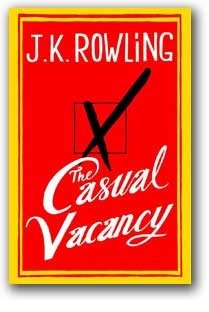
Future Fragments: J.K. Rowling, Elections + the 1%
Written by: Anastasia Salter, Pop-Culture Editor
 J.K. Rowling’s first novel for adults is already attracting plenty of criticism and skepticism: and let’s face it, at this point she can do anything she wants. She doesn’t need this book to sell. If you’ve read the reviews of J.K. Rowling’s The Casual Vacancy on Amazon alone, you know already that it hasn’t been well received. Like the most ardent of Harry Potter fans, I pre-ordered the book long before reviews were even an issue. And while I approached it with some trepidation, I was surprised by how firmly grounded in reality this work is. That is perhaps everyone’s biggest objection: there’s nothing escapist about J.K. Rowling’s unforgiving depiction of small-town politics, pettiness, drama and abuse. J.K. Rowling has perhaps unwittingly reminded us what made Hogwart so appealing: it offered a magic place removed from all these things. Take away the magic, and all that is left is the harshness of reality.
J.K. Rowling’s first novel for adults is already attracting plenty of criticism and skepticism: and let’s face it, at this point she can do anything she wants. She doesn’t need this book to sell. If you’ve read the reviews of J.K. Rowling’s The Casual Vacancy on Amazon alone, you know already that it hasn’t been well received. Like the most ardent of Harry Potter fans, I pre-ordered the book long before reviews were even an issue. And while I approached it with some trepidation, I was surprised by how firmly grounded in reality this work is. That is perhaps everyone’s biggest objection: there’s nothing escapist about J.K. Rowling’s unforgiving depiction of small-town politics, pettiness, drama and abuse. J.K. Rowling has perhaps unwittingly reminded us what made Hogwart so appealing: it offered a magic place removed from all these things. Take away the magic, and all that is left is the harshness of reality.
With that said, the book has several merits: I was struck by the characters, each filled with self-doubt or deserved self-loathing, all so painfully human as to serve as warnings and mirrors. Rowling’s greatest strengths are in her characters–remember the plot of book 7?–and that holds true in her adult work as well. But the portraits in Casual Vacancy are far darker and less flattering, reminiscent of the ominous beauracrats of the the Ministry of Magic, a far cry from the wholesome family life of the Weasleys or even the dysfunctional loyalty of the Malfoys. These are not characters I would want to meet, and it’s hard to imagine any of them as the center of any elaborate fantasies of imagination or fandom.
However, they are clearly characters of passion, if for no other reason than J.K. Rowling did not need to write this book. After all, J.K. Rowling is one of the richest people alive. This is no small feat for a writer–most writers toil in relative obscurity and/or poverty, even when marginally successful–and it remains a source of discontent. Why her? Why Hogwarts? Why this school of magic, when everyone from Diana Wynne Jones to Caroline Stevermer to Ursula K. LeGuin had imagined their own versions? If the Amazon reviews are harsher than usual, it is perhaps a reminder of those lingering questions, the resentment that someone of her talent cannot help but inspire alongside the worship and adoration.
The Casual Vacancy is well-timed for the US, although it primarily concerns itself with the small-town politics of the UK. As I watch (ok, mostly avoid) the more outrageous and terrifying aspects of our election, If we read Rowling’s lastest novel as intensely political, she’s not discouraging our view. She’s made several political statements during the release, including the reminder that unlike most British billionaires she has stayed a resident of the UK, subject to al l the taxation she could have avoided by shifting her home. Her words join the chorus of the elite who’ve expressed willingness to pay taxes to provide for public services: a powerful contrast to the rhetoric of Romney’s camp.
I chose to remain a domiciled taxpayer for a couple of reasons. The main one was that I wanted my children to grow up where I grew up, to have proper roots in a culture as old and magnificent as Britain’s; to be citizens, with everything that implies, of a real country, not free-floating ex-pats, living in the limbo of some tax haven and associating only with the children of similarly greedy tax exiles (source)
So, novel or political tract, The Casual Vacancy is very much a reflection of our moment. While the Occupy movement has faded from our collective attention, Romney’s use of percentages in determining the value of part of the country and the continuing tension over the disparity of wealth worldwide. Who better to address it than a woman who offers us the ultimate fulfillment of the rags to riches story in her own life, with a rock-star ascension appropriate to one of her fantastical characters–just as this book chronicles a fate far more average and inescapable.
